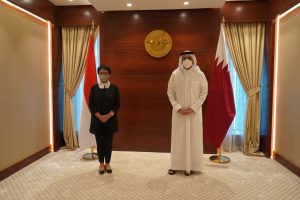At the end of March, Indonesia and Qatar signed a Letter of Intent regarding humanitarian and development assistance for the people of Afghanistan. The agreement, which was signed by Indonesian Foreign Minister Retno Marsudi and Qatari Foreign Minister Muhammad bin Abdurrahman al-Thani, reflects the two nations’ concern and commitment regarding the humanitarian crisis currently unfolding in Afghanistan, especially as regards the status of women and children.
Retno also stated that the assistance involves long-term aid, including scholarships and vocational training programs tailored to the needs of the Afghan people, and plans to hold public dialogues about the role of women in Afghan society.
Alongside this, Indonesia continues to demonstrate its ability to seek to build relations with Afghanistan in overcoming the crisis prompted by the Taliban takeover last August, offering humanitarian aid and funding equivalent to $2.85 million in the period from 2022 to 2024.
Also in March, representatives from Afghanistan, Indonesia, and Qatar held a meeting in Doha to discuss the situation in Afghanistan, during which they addressed the dire humanitarian, economic, and educational situation in the country. In addition to providing humanitarian assistance, Indonesia and Qatar have also actively voiced the importance of the Taliban respecting women’s rights.
Doha and Jakarta have committed to oversee the transition period and brought the issue of humanitarian crises up in international forums. In her statement, Retno stated that the Indonesian and Qatari governments were ready to oversee the transition to a safe, just, and prosperous Afghanistan.
The emerging collaboration between Indonesia and Qatar on the Afghanistan issue is not surprising. Qatar’s efforts to establish close relations with the Taliban are based on the nation’s desire to strengthen its position as a regional mediator. This corresponds to one of Indonesia’s core foreign policy priorities under President Joko “Jokowi” Widodo’s administration.
Upon taking office in 2014, Jokowi unveiled new policies that sought to enhance Indonesia’s standing on the global stage. The most important of these was the country’s “4+1” foreign policy outline, which refers to “strengthening economic diplomacy; protection diplomacy, sovereignty, and national diplomacy; and Indonesia’s role in the region and globally.” The “+1” refers to the strengthening of the infrastructure of diplomacy.
This common interest appears to have prompted the two countries to cooperate with each other to mediate the crisis in Afghanistan. Doha’s invitation to Indonesia to the recent meeting also reflects Indonesia’s success in building trust with the Taliban government. As the world’s most populous Muslim country, Indonesia is seen as being able to mediate conflicts in the Muslim world, including the Afghanistan issue. Moreover, Qatar also saw Indonesia’s interest in mediating the Gulf crisis of 2017.
Indonesia’s Islamic identity is also augmented by its neutral position, resulting in Afghanistan’s Taliban leadership having more confidence in dealing with Indonesia than with other countries. This neutral position is of course in accordance with the mandate of the domestic constitution, which says that Indonesia’s aim is to foster world peace within the contours of Indonesia’s “free and active” foreign policy, which does not take sides in geopolitical disputes.
It is important to note that Indonesia was also recently invited by China to its first meeting of “Neighboring Countries of Afghanistan Plus Afghanistan.” This implies that Indonesia’s neutrality and prominence in the Muslim world have made other countries interested in collaborating with it on issues involving other Muslim nations.
Indonesia and Afghanistan have a long history of cooperation. Afghanistan was one of the first countries to recognize Indonesia’s independence, in 1947, two years after the beginning of the country’s struggle against Dutch rule. In addition, Indonesia and Afghanistan have cooperated in the fields of capacity building and counter-terrorism, and had modest but consistent economic relations. Indonesia is the 14th largest destination for Afghanistan’s exports, while Afghanistan is one of Indonesia’s largest export destinations in the Middle East.
In April 2017, Indonesia also became the first Southeast Asian country to be visited directly by then Afghan president, Mohammad Ashraf Ghani, which resulted in the signing of a memorandum of understanding relating to education, agriculture, statistics, bureaucratic reform, and fiscal policy.
Lastly, Qatar-Indonesia cooperation on Afghanistan affairs is also related to the overall growing ties between the two. Doha and Jakarta often meet at various multilateral forums to discuss political issues at both regional and international levels. This takes place alongside the economic, cultural, and defense cooperation that have been increasingly pursued by the two countries.
Therefore, looking into the near future, the cooperation between Jakarta and Doha on Afghanistan affairs is not only likely to continue, but may expand to other issues in the wider Muslim world. The key now is how the two nations extend this cooperation beyond diplomatic gestures not only to strengthen their own ties, but also to bring real-world solutions to Afghanistan and beyond.

































